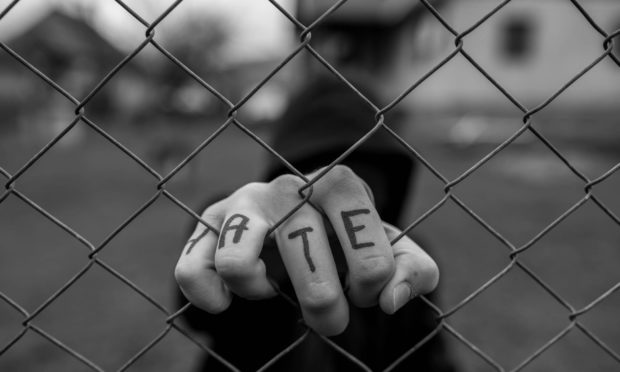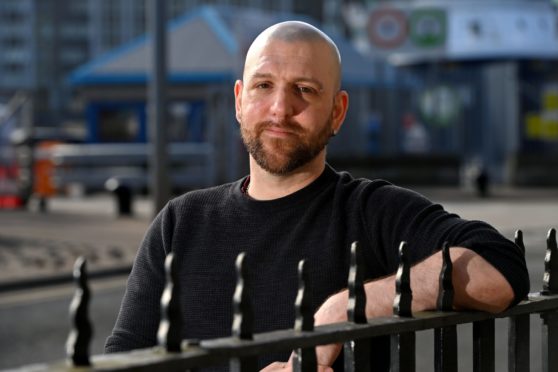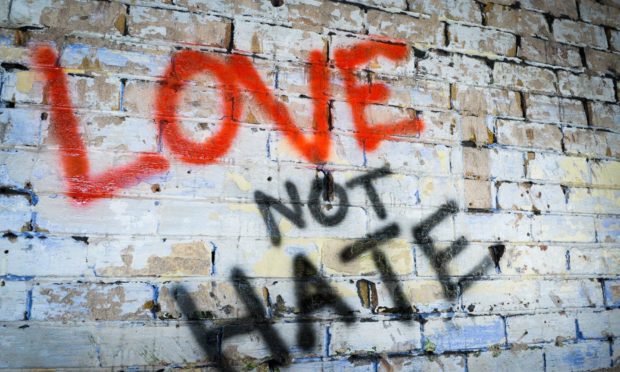Calls have been made for more to be done to tackle “despicable” hate crime, with one charity leader saying education is a “key weapon” in the fight.
The number of hate crimes reported overall across the north and north-east has fallen slightly in the past year, new figures show.
However, racially aggravated offences reported in Aberdeen have increased, and sexual orientation hate crimes rose in both the Granite City and Inverness.
While the total of hate crimes reported in the north and north-east went from 629 in 2019/20 to 621 in 2020/21, Aberdeen, Banff and Fort William saw increases.
A report on Hate Crime in Scotland 2020-21 reveals that nationally there has been an increase of 4% in the total number of charges reported to Crown Office and Procurator Fiscal Service.
The majority of hate crime charges contain a racial element, while the proportion that relate to sexual orientation has increased from 11% in 2011-12 to 29% in 2020-21.
The number of disability aggravated charges increased by 14% to 448 in 2020-21.
The north-east picture
Hate crimes reported to the PF in Aberdeen rose from 323 in 2019/20 to 362 in 2020/21. Racially aggravated crime rose from 183 to 204.
Religiously aggravated offences stayed the same both years at 13, while those relating to disability increased from 19 to 27.
Hate crimes relating to sexual orientation went from 105 to 117 in the past year. However offences with a transgender identity aggravation decreased from three to one.
‘Sad to see rise in hate crimes’
Deejay Bullock, community relations manager with north-east charity Four Pillars, said education was vital in the bid to reduce such offences.
He said: “It is sad to see yet another rise in hate crimes across Scotland, especially as we know that around 4 in 5 hate crimes still go unreported.
“During the pandemic, Four Pillars have been working alongside Police Scotland, ACC, and other third sector organisations to put an action plan together to tackle these crimes, and we hope as lockdown eases we are able to put those plans into action.
“Our aim is to get back out across Grampian to educate the community on LGBT+ awareness, what a hate crime is, how to identify a hate crime, and how to report it – including third-party reporting through services like Four Pillars.”
‘Education key weapon’
He added: “Four Pillars has also recently rolled out a new LGBT+ Awareness training session that incorporates these topics and is currently providing this to corporations and organisations across the region. Education remains one of the key weapons in reducing hate crimes and it’s vital, now more than ever, we get back out there as soon as possible”.
Elsewhere in the region, Banff also saw a slight rise in hate crimes reported going from 13 to 15. Ten of the offences reported in the past year related to race, while two were aggravated by transgender identity.
In Peterhead offences reported with a racial aggravation fell from 43 to 24 and those relating to sexual orientation dropped from 21 to 15.
Meanwhile in Elgin hate crimes relating to race stayed level at 35 both years, and for sexual orientation, there was a drop from 13 to 9.
Dave Black, general manager of the Grampian Regional Equality Council (GREC) said: “As an organisation we know that the significant majority of these types of crimes are not reported, and so the figures only tell us so much.
“We are also seeing an increased demand for the advice, advocacy and counselling services that we offer at GREC. In the context of Covid-19 and Brexit, it is a time where positive community relations are under threat, and we need to ensure that basic human rights and equality are protected.
“This requires leadership from organisations across the region to prioritise equality and human rights. ”
‘Hate crime is a blight on country’
Superintendent Neil McDonald, of North-East Division, said hate crimes were “despicable” and called on those who experience such crimes or witness them to come forward.
He said: “Hate crime is a blight on our country, and an offence which Police Scotland does not tolerate. Targeting anyone because of a disability, their race, religion, sexuality or transgender identity – or a perception of these characteristics – is despicable.
“We know this is an often under-reported offence. People who are victims have often been targeted a number of times before they report to officers and can find it difficult to talk about it. We encourage anyone who has been a victim – or who has witnessed a hate crime – to come forward and report it.
“Police Scotland takes every report seriously and carries out a robust investigation into every set of circumstances.
“Hate Crime can be reported at a police office or via 101 or 999 in an emergency. Alternatively, if people do not feel comfortable approaching police directly, they can use the network of Third Party Reporting Centres across the country, or contact Crimestoppers anonymously.”
Hate crime in Highlands and Islands
In the north, figures were low and Inverness saw racial hate crimes drop from 44 in 2019/20 to 37 in 2020/21, though religiously aggravated offences went from one to five.
Those relating to disability went from three in 2019/20 to four in 2020/21.
Hate crimes relating to sexual orientation rose from 12 to 14, and for transgender identity there was a drop from two to zero.
Edward Mountain, Conservative Highlands and Islands region MSP, said: “Highlanders have a reputation for welcoming people and I am pleased to see these figures remain fairly low.”
Meanwhile, in Fort William the total number of hate crimes reported rose from 24 to 34. During this past year 20 of the offences reported were related to sexual orientation – compared to seven the previous year.
Tain saw a drop in offences with a disability aggravation going from 10 in 2019/20 to two in 2020/21, but racial offences increased from five to seven.
Wick also saw a rise in racially aggravated offences being reported to the PF going from five to 11.
Plea to victims to report hate crimes
The Lord Advocate, James Wolffe QC, said: “Scottish prosecutors are committed to tackling crimes motivated by hatred and prejudice. Any victim of such offending should come forward and report it to the appropriate authorities.
“They can be confident that prosecutors will continue to respond to any such report robustly, appropriately and fairly.”
‘More to do’ to tackle hate crime
Cabinet Secretary for Justice, Keith Brown, said: “We recognise that hate crime has a hugely damaging effect on victims, their families and communities and we all must play our part to challenge it. These figures show there is more to do to tackle hatred and prejudice in Scotland and we will continue our work to ensure it will not be tolerated.
“As we press ahead with the development of our new hate crime strategy, which will include implementation of the Hate Crime and Public Order (Scotland) Act 2021, we will consider how we can continue to raise awareness and encourage reporting. We will also consider how to more effectively break down barriers to reporting.
“It is important that we continue to take steps to tackle hate crime, continue to raise awareness and work to reassure communities that we are doing everything we can to prevent hate crime in all its forms. Anyone who experiences or witnesses a hate crime should report it to the police or via a third party reporting centre.”
Find out more about reporting hate crimes here



